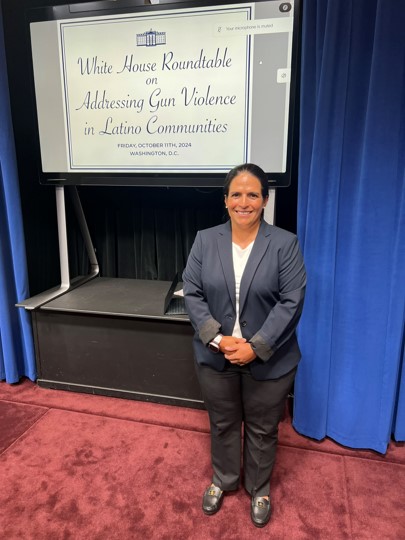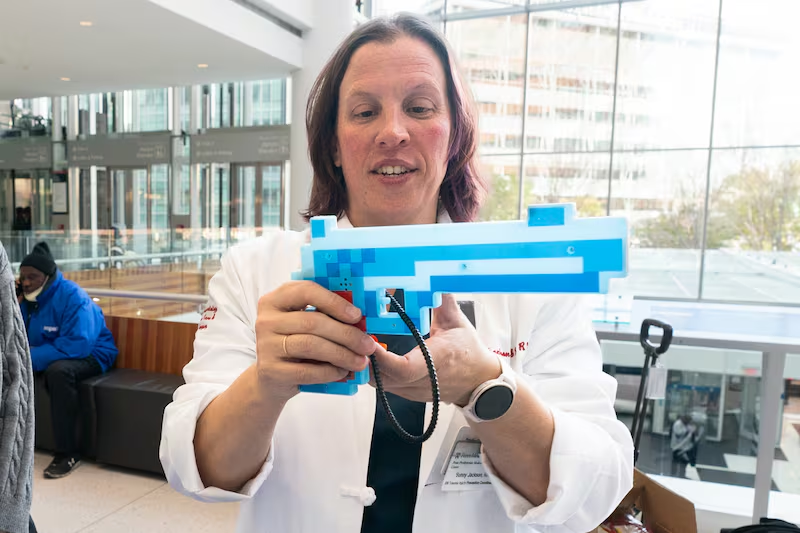PISC Publications and News Features

Dr. Vivek Ashok, a postdoctoral fellow part of the National Clinical Scholars Program, has been active in press conferences, op-eds, committee hearings, and webinars regarding the impacts of gun violence and the ways to improve gun safety and public safety through clinical, community, and policy strategies.

Dr. Laura Vargas, past trainee and postdoctoral fellow at the Penn Injury Science Center, was one of nine speakers invited to partake in the White House Roundtable on Addressing Gun Violence in Latino Communities on October 11, 2024. It is the first meeting of its kind and included representatives from government, philanthropy, policy, nonprofit, and academic sectors, as well as survivors and co-survivors of gun violence. Now faculty at the University of Colorado School of Psychiatry, Dr. Vargas presented gun trafficking research. Thank you for bringing injury science to the forefront of policy discussions, Dr. Vargas!

In a recent perspective piece, Vivek Ashok and colleagues highlight the significance of a new White House executive order enabling state Medicaid programs to reimburse health care providers for counseling on secure firearm storage.
With firearm injuries now the leading cause of death among children in the U.S., this policy offers a critical opportunity to address preventable tragedies. Research shows that even modest improvements in firearm storage could prevent hundreds of injuries and deaths annually. Medicaid reimbursement not only supports lifesaving counseling but also reduces the financial burden of firearm injuries, which cost taxpayers billions each year.

The Safe Path program, a collaboration between the Philadelphia School District and the Penn Injury Science Center (PISC), aims to enhance school and community safety during dismissals. Led by Bernadette Hohl from PISC and supported by Anthony Singleton of Educators 4 Education (E4E), the program places trusted adults as Safe Path monitors to promote positive engagement and address conflicts.
Safe Path currently operates at several Philadelphia high schools, providing critical support to students and fostering safer communities. Inspired by Chicago’s Safe Passage initiative, the program has shown promising results and plans to expand further.
Learn more about E4E and the Safe Path program in the Southwest Globe Times.

Kit Delgado has been honored with a 2024 City & State Pennsylvania Impact Award. Dr. Delgado, an emergency physician and epidemiologist, leads innovative efforts to improve public health, including reducing distracted driving, promoting secure firearm storage, and addressing opioid overprescribing. His groundbreaking work exemplifies the transformative impact of behavioral design in health systems.
Learn more about this prestigious recognition: 2024 Impact Awards.

Joel Fein co-authored research highlighting the protective role of supportive adults in mitigating intergenerational transmission of adverse childhood experiences (ACEs). Using data from over 1,000 households, the study found that children with strong connections to supportive adults had lower odds of adversity, even when parents faced high ACE exposure. The findings underscore the critical role of nurturing relationships in breaking cycles of trauma.
Read the study: Disrupting Intergenerational Flow of Childhood Adversities.

Sunny Jackson, part of the Penn Trauma Violence Recovery Program, led a team distributing free gun safes and locks at the Perelman Center for Advanced Medicine. The initiative, part of Penn’s efforts to reduce firearm injuries, aims to keep guns away from children while meeting gun owners’ needs for safe and accessible storage.
The program has already provided over 60 gun locks and 21 safes, with more available through mail orders for Philadelphia residents. Secure firearm storage saves lives by preventing accidental shootings and reducing risks of suicide. Read more.

Katie Hoskins, with co-investigators Joel Fein, and Dorothy Novick, leads a new study funded by a $3.2 million NINR grant. This five-year project at Children’s Hospital of Philadelphia (CHOP) scales out the S.A.F.E. Firearm intervention, promoting secure firearm storage to reduce injury risks among children.
The nurse-led intervention, adapted for inpatient settings, provides parents with safety discussions and free cable locks. The study involves 12 randomized CHOP units, aiming to integrate firearm safety into pediatric care. Read more.

The work of Gina South, Nicole Thomas, and colleagues is featured on the cover story of the fall/winter 2024 issue of Penn Medicine magazine. In transformative efforts to address structural drivers of health disparities, the work highlights the link between environmental interventions—like greening vacant lots—and reductions in violence and health disparities. Initiatives such as Deeply Rooted and Lift Every Voice foster community partnership and address systemic inequities.
Read the full article: Health, Greenery, and Justice for All.

Dave Humphreys, led a study estimating the growth of the U.S. civilian firearm stock, projecting an increase from 378 million firearms in 2022 to 565 million by 2034 under current trends. The study, published in JAMA Network Open, highlights how modest increases in firearm attrition rates (from 1% to 3%) could reduce the stock by over 115 million.
Improved infrastructure, such as enhanced buyback programs and services for unwanted firearm disposal, may help mitigate the risks associated with this growing stockpile. Read more: Full Study.

The Young Chances Foundation, founded by Tyrique Glasgow of the Penn Injury Science Center’s Community Action Board, was selected as a beneficiary of the Assists for Safe Communities program. For each assist during the 76ers season, $76 will be donated to support grassroots violence prevention programs, including Young Chances’ critical work in Philadelphia.
Learn more about this initiative: In-Game Assists Turn to Violence Prevention Dollars.

Gabriela Khazanov, a research psychologist with the Philadelphia VA and the University of Pennsylvania, co-authored a groundbreaking study on the impact of collaborative care in primary care settings. The research, featured in Healthcare Innovation, highlights improvements in depression, anxiety, and suicidal ideation among patients receiving integrated behavioral health services at Penn Medicine. Read more.
